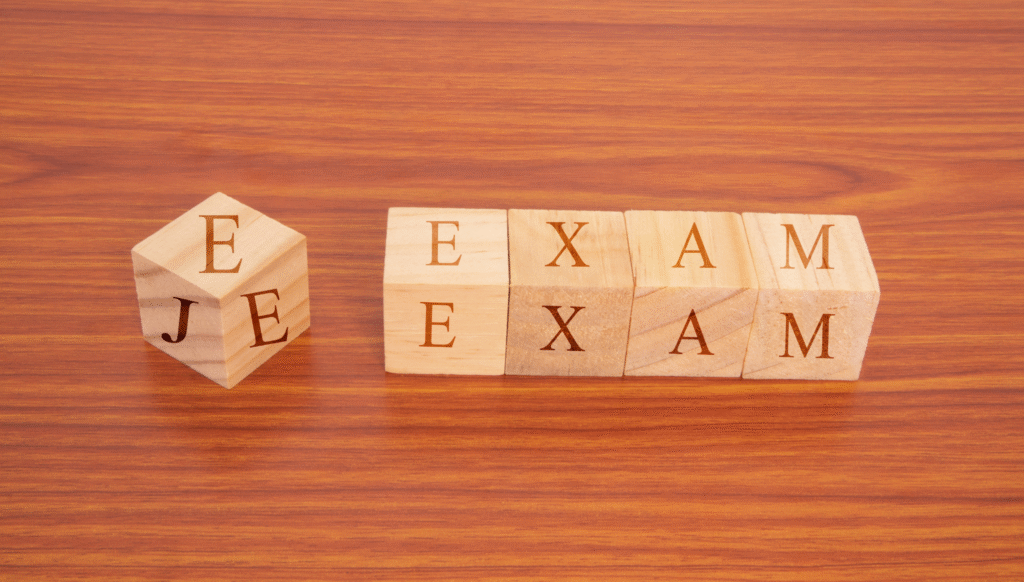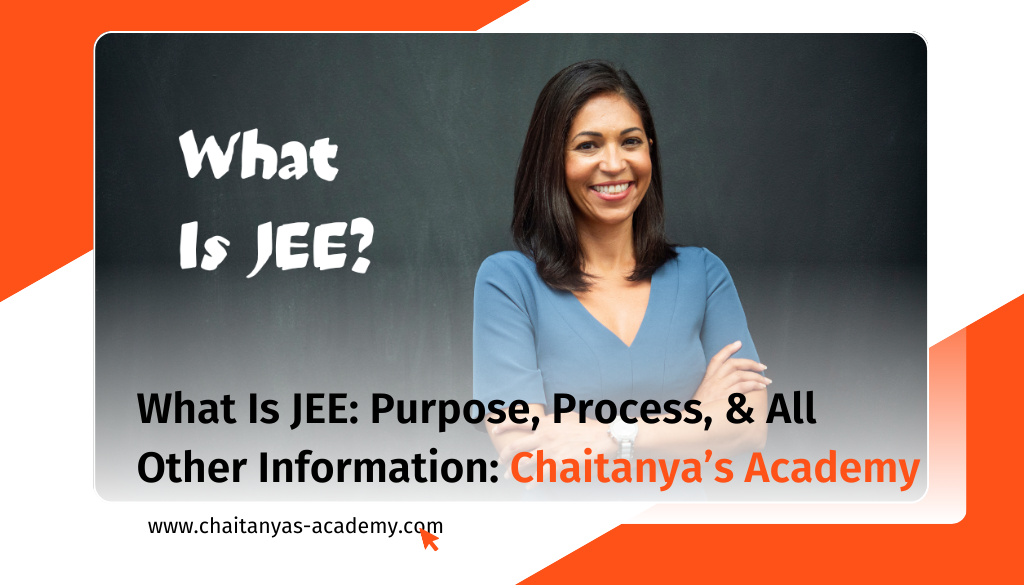What Is JEE: Purpose, Process, & All Other Information
If you’re reading this, I’m assuming you’ve probably heard of JEE.
Maybe from a friend, from relatives, your coaching class, or just the pressure of choosing science in class 11. But hearing about it and understanding it is a totally different story.
You might already know it’s a big engineering entrance exam, but…
- What exactly does it lead to?
- What’s the difference between JEE Main and JEE Advanced?
- How does the whole process work — from applying to finally getting into college?
- And most importantly: Where do I even start?
This guide is for students like you — not just to tell you what JEE is, but to make things clear, simple, and realistic. Whether you’re confused about the process, looking for smart prep tips, or just want everything in one place — you’re in the right spot.
Let’s break it all down — no jargon, no fluff, just what you need to know.
What Is JEE?

JEE, or Joint Entrance Examination, is one of the most competitive engineering entrance exams in India. It’s the gateway to prestigious engineering institutes such as
- the IITs (Indian Institutes of Technology),
- NITs (National Institutes of Technology),
- IIITs (Indian Institute of Information Technology), and
- other centrally funded institutions (GFTI — Government Funded Technical Institutes).
Every year, lakhs of students like you appear for JEE with the dream of getting into these top engineering colleges.
To make that dream a reality, you must clear a two-phase examination process:
- JEE Main
- JEE Advanced
But before we jump into that, let’s understand why this exam exists.
Purpose of JEE

The purpose of JEE is simple yet powerful:
- To provide a common platform for evaluating students from all across India, regardless of their school board or background.
- To recognize true potential, even in students who may not have access to the best coaching or resources but have the potential to succeed.
- To standardize the admission process, so that every engineering aspirant goes through the same fair and transparent system.
- To inspire a mindset of discipline, problem-solving, and persistence — qualities that matter far beyond the exam hall.
- To ensure that admissions to engineering colleges are based on merit, knowledge, and aptitude.
- To identify students who are capable of handling the rigorous academic training offered at institutes like the IITs and NITs.
- To create an equal opportunity system—where your rank, not your region, not your religion, not your caste—determines your future.
Types of JEE: Main vs Advanced

Now let’s understand the two phase examination process that I’ve mentioned above.
JEE Main
- Conducted by: NTA (National Testing Agency)
- Held: Twice a year (January & April sessions)
- For admission into: Best NITs, IIITs, GFTIs, and acts as a qualifying exam for JEE Advanced
- Subjects: Physics, Chemistry, and Mathematics
- Format: Objective-type questions with negative marking
You can appear in both sessions of JEE Main, and your best score will be considered for ranking.
📌 Also: Best NITs in India
JEE Advanced
- Conducted by: One of the IITs (changes every year)
- Held: Once a year
- For admission into: IITs
- Only the top 2.5 lakh rankers of JEE Main are eligible to apply
JEE Advanced is considered more concept-driven and analytical, designed to test problem-solving ability, not just memory.
JEE exam process: Step-by-step

Let’s understand the JEE process step by step.
Registration & application form
Fill out the online form on the official NTA website for JEE Main. For JEE Advanced, registration happens separately for those who qualify Main.
Admit card download
After the application window closes, you’ll receive your hall ticket for the exam.
Examination
You’ll appear for the JEE Main exam. If you clear the cutoff, you’ll qualify to apply for JEE Advanced.
Results
The NTA releases your percentile, AIR (All India Rank), and eligibility status.
Counseling (JoSAA)
After the results, you can participate in JoSAA Counseling, where you’ll fill in your preferred colleges and branches. Based on your rank, you’ll be allotted a seat.
Admission
Once allotted, you submit documents and secure your admission to one of India’s top engineering colleges.
Familiar with the process? Let’s move to 👇
Eligibility criteria

To appear for JEE, students must meet the following criteria:
Educational qualification
You must have passed (or be appearing in) Class 12 or an equivalent examination from any recognized board, including CBSE, ICSE, State Boards, and open schooling systems.
Mandatory subjects
Your subjects should include Physics, Chemistry, and Mathematics.
Age limit
There is no upper age limit for JEE Main. However, you must meet the year of passing criteria, which is typically within the 2 years of passing the 12th board exams.
Attempts for JEE Main
You are allowed two attempts for JEE Main, with two attempts available per year. This means a total of four attempts across two years.
Attempts for JEE Advanced
You can appear for JEE Advanced only twice in consecutive years. This means a total of four attempts across two years.
Important update regarding JEE attempts
On November 5, 2024, the Joint Admission Board (JAB) announced that students would be allowed three attempts for JEE Advanced. However, just 13 days later, on November 18, 2024, this decision was reversed, reducing the attempt limit to two consecutive attempts.
However, the Supreme Court intervened on January 10, 2025, allowing students who had dropped out of their courses between November 5 and November 18, 2024, based on the initial announcement, to register for JEE Advanced. The court recognized that these students acted on the earlier notification and should not be penalized for the subsequent policy change (indiatoday.in).
Syllabus overview

The JEE Mains 2025 exam pattern and syllabus is based on the topics you study in Class 11 and 12. So don’t think that you’re preparing for something entirely new. It’s the same stuff with advanced knowledge and understanding. Here’s a quick subject-wise breakdown:
- Physics: Mechanics, Thermodynamics, Electricity, Magnetism, Optics
- Chemistry: Physical Chemistry (moles, solutions), Organic Chemistry (reactions, mechanisms), Inorganic Chemistry (Periodic table, bonding)
- Maths: Algebra, Calculus, Coordinate Geometry, Probability, Trigonometry, Vectors
While the syllabus may look vast like an elephant at first glance, the good news is—it’s completely aligned with the NCERT curriculum. If you stay consistent with your studies and revise regularly, cracking IIT JEE in your first attempt will be a cakewalk.
💡 Remember: You don’t need to cover everything overnight or in a week—it’s about making steady, step-by-step progress.
📌 Also: Practical Tips To Not Lose Motivation During Your IIT JEE Preparation
Exam pattern (JEE Main)
| Subject | Total Questions | Questions to Attempt | Marks |
| Physics | 30 | 25 | 100 |
| Chemistry | 30 | 25 | 100 |
| Mathematics | 30 | 25 | 100 |
| Total | 90 | 75 | 300 |
✅ Correct Answer: +4 marks
❌ Incorrect Answer: –1 mark
⏳ Duration: 3 hours
💻 Mode: Computer-Based Test (CBT)
Note: There are two sections in each subject:
- Section A: 20 MCQs – all are compulsory.
- Section B: 10 numerical value questions – you need to attempt only 5.
Exam pattern (JEE Advanced)
JEE Advanced is known for its variable and unique pattern every year—the number of questions, marking scheme, and types of questions often change. However, here’s a general idea based on recent trends:
| Paper | Subjects | Types of Questions | Marks |
| Paper 1 | Physics, Chemistry, Maths | MCQs, Integer-type, Matrix Match, Paragraph-based | ~180–200 |
| Paper 2 | Physics, Chemistry, Maths | Same structure, different questions | ~180–200 |
| Total | ~360–400 |
- Each paper is 3 hours, so total duration = 6 hours
- Two papers are mandatory (Paper 1 and Paper 2)
- Questions are concept-heavy and test application, reasoning, and accuracy
💡 Pro tip: Since the pattern is unpredictable, understanding concepts deeply and practicing multiple question types is key to cracking JEE Advanced.
How to prepare for JEE?

Cracking JEE isn’t just about hard work—it’s about smart work. With the right strategy, IIT JEE reference books, and self-study can take you to the IITs. Here’s how you can prepare smartly:
- Stick to NCERTs for theory and basics
- Use standard reference books (like HC Verma for Physics, OP Tandon for Chemistry)
- Practice, practice, practice – especially with mock tests and previous years’ papers
- Take regular breaks and track your progress
- Don’t shy away from doubt-solving or group discussions
Colleges that accept JEE scores
Crack JEE and you can get into:
- IITs (through JEE Advanced)
- NITs (through JEE Main)
- IIITs and other central government engineering colleges (through JEE Main)
- Several top private engineering colleges also accept JEE Main scores (like DTU, NSUT, and some state colleges)
JEE myths

Preparing for JEE is stressful enough, right?
But you know what makes it worse? Let me guess…
The myths that are floating around. From random advice on social media to scary seniors whispering half-truths, it’s easy to get caught up in things that simply aren’t true.
Before you let these myths mess with your confidence or strategy, let’s bust them wide open. 💥
🚫 “You need to start preparing from Class 8.”
Nope, starting in Class 11 is good enough with the right strategy.
🚫 “You need to be a genius to crack JEE.”
Nope. You don’t need to be Einstein. JEE rewards consistency, clarity of concepts, and practice—not some magical brainpower.
🚫 “If I don’t score well in mock tests, I won’t clear JEE.”
Mock tests are for practice and learning—not prediction. Many toppers had average mock scores but nailed the actual exam because they learned from their mistakes.
🚫 “Skipping a topic means you’ve already lost.”
Relax! While every topic is important, it’s okay to be stronger in some areas. Smart strategy is to focus on your strengths and cover high-weightage chapters well.
🚫 “You must join the most expensive coaching to succeed.”
Not true. Expensive doesn’t always mean better. Plenty of coaching like Chaitanya’s Academy offers affordable JEE classes that can help you crack JEE.
🚫 “Only IITians can teach you how to get into IIT.”
Good mentors come from all backgrounds. A teacher who simplifies concepts and motivates you is far more valuable than just a fancy tag.
Hope you got a clear picture of what JEE is all about!
JEE isn’t just another exam—it’s a test of your patience, mindset, and how well you can keep showing up, even when it gets tough. But the truth is: You don’t need to be a topper. You just need to be consistent.
- Stay curious.
- Stick to a smart plan.
- Believe in yourself, even on the rough days.
That’s what makes the real difference. 🧠💪
And hey, if you’re looking for someone to guide you through it all—Chaitanya’s Academy—one of India’s best IIT JEE coaching institutes is here for you.

With experienced teachers, a clear study roadmap, and support that actually feels human—we help students like you go from confused to confident.
So whether you’re just starting out or stuck somewhere in the middle—let Chaitanya’s Academy help you.
Enroll now and take the first step toward your JEE success!
Frequently Asked Questions
What is the full form of JEE?
Answer: JEE stands for Joint Entrance Examination.
What is JEE for?
Answer: JEE is conducted to select students for undergraduate engineering programs like B.Tech and B.E. at IITs, NITs, IIITs, and other government-funded institutions.
What is the difference between JEE Main and Advanced?
Answer: JEE Main is the qualifying exam for most engineering colleges and also the eligibility test for JEE Advanced. JEE Advanced is for admission into IITs and is known for its high difficulty level and deeper problem-solving focus.
Can students from open schooling or state boards apply for JEE?
Answer: Yes! Students from NIOS or any state board are eligible to apply for JEE, provided they have Physics, Chemistry, and Mathematics in Class 12.
JEE exam is for which course?
Answer: JEE is primarily for engineering courses like B.Tech and B.E., but it also covers B.Arch and B.Planning in some colleges.
What is the exam process after JEE Advanced?
Answer: After JEE Advanced, students participate in JoSAA Counselling to select colleges, lock in preferences, and get seat allotments based on their AIR and availability.
What is a good score in JEE Main?
Answer: A score of 200+ in JEE Main is considered great for top NITs. However, cutoffs may vary depending on the exam’s difficulty and competition.




